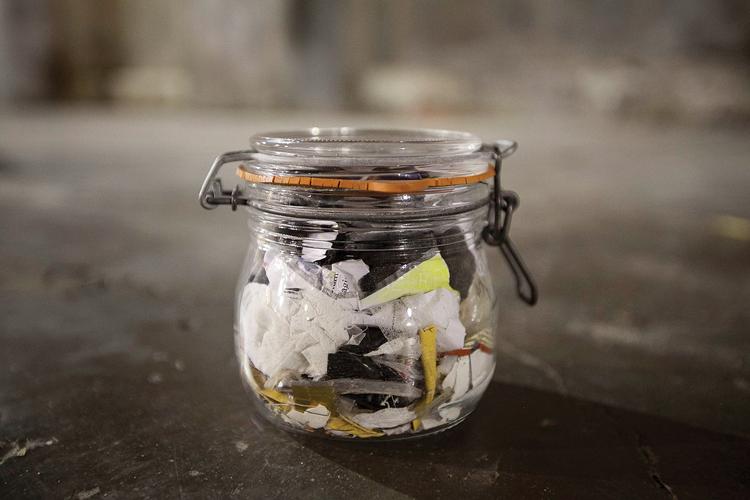Pop a bag of popcorn in the microwave, eat a pre-packaged snack, have a bottle of water. Fill your trash can with the wrappers and do it all again, because life comes with bags of trash. Right?
Bea Johnson and her family have stopped taking out the trash for good. Now, all the waste her family cannot recycle or compost goes into a glass jar. Johnson, her husband and two kids fill about one jar a year.
“Our transformation was not overnight, but rather gradual … to choosing a more environmentally-friendly way of living,” Johnson said.
It started in 2008. The family downsized homes, opting for a minimalist lifestyle.
“The first year, we moved into an apartment with only the necessities — that’s where we learned that living with less allowed us to live more,” she said. “The second year, we bought a house half the size of the previous one; we let go of 80 percent of our belongings.
“Then our voluntary simplicity opened time to educate ourselves on environmental issues. That’s when we decided to change our way of living for the sake of our kids’ future.”
Johnson noticed they family was producing less trash when her husband went to empty the trash can in 2010, and there was hardly anything in it. That’s when she decided to start collecting the family’s trash in a jar. It showed how little waste they actually produced when consciously thinking about it.
She expanded the three R’s of the environment — reduce, reuse, recycle — to five.
• Refuse items you don’t need, such as plastic utensils, and refuse to buy prepackaged food; instead, opt for buying in bulk and using your own containers.
• Reduce what you actually “need” — choose furnishings, clothing and other items that you will actually hold on to.
• Reuse items — use cloth shopping bags that you can use week after week, and bring your own containers to fill at grocery stores.
• Recycle what you cannot refuse, reduce or reuse.
• Rot — also known as compost — what you can, such as food scraps and other organic material.
Johnson, who lives in Mill Valley, Calif., is on the road promoting her book “Zero Waste Home: The Ultimate Guide to Simplifying Your Life by Reducing Your Waste.” Her message has gained a lot of traction: She has more than 100,000 followers on Facebook, her blog has an extensive following, and her YouTube video presentations have been viewed more than a half a million times.
She will be speaking at the Stowe Theater Thursday Oct. 19; admission is free and all donations made will go to Vermont Public Interest Research Group. The nonprofit is a consumer and environmental advocacy organization that promotes zero waste in Vermont by proposing legislation that would take waste out of the equation.
How can you do it?
“Zero waste is more what we do outside the home than what we do inside the home,” Johnson says in her informational video online, which details how she chooses to live a zero-waste lifestyle.
“Instead of going in the middle aisles, I only do the perimeter of the store,” Johnson says. “And the perimeter of the store is also what’s healthier for you.”
Many stores have bulk sections, selling anything from dried fruit to oils to spices. Explore a variety of grocery stores — the Morrisville Co-op, Sterling Market in Johnson, Village Market of Waterbury, Commodities Natural Market in Stowe, Sunflower Natural Market in Waterbury Center.
Bring your own containers — mason jars, cloth bags or other types of containers you can use over and over. Fill them up, then when you’re running low, fill them up again.
Johnson suggests using your own containers for deli meats and cheese. Same works for breads and other bakery items, or even meat from a butcher.
Going on vacation, or a day trip? A reusable water bottle and reusable bag go a long way.
Johnson has reduced the products she uses for cleaning and makeup. She says making her own products is cheaper than buying the finished products, and she can control what goes into the products.
Overall, the zero-waste lifestyle has saved her family 40 percent of its consumer spending, because they consume less.
“What I love most about the lifestyle is the simple life, and how much closer it has brought my family,” Johnson said. “Once you discover a lifestyle based on being instead of having, you just can’t go back.”


















(0) comments
Welcome to the discussion.
Log In
Keep it clean. Please avoid obscene, vulgar, lewd, racist or sexual language.
PLEASE TURN OFF YOUR CAPS LOCK.
Don't threaten. Threats of harming another person will not be tolerated.
Be truthful. Don't knowingly lie about anyone or anything.
Be nice. No racism, sexism or any sort of -ism that is degrading to another person.
Be proactive. Use the "Report" link on each comment to let us know of abusive posts.
Share with us. We'd love to hear eyewitness accounts, the history behind an article.